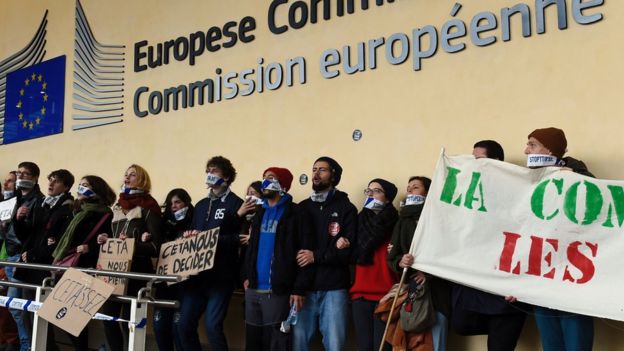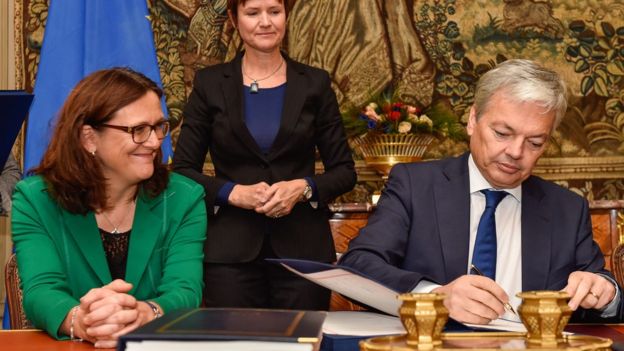The European Union and Canada have signed a long-delayed landmark trade deal, following weeks of uncertainty due to opposition in Belgium.
The deal was signed in Brussels by Canadian Prime Minister Justin Trudeau and top EU officials.
The signing ceremony initially planned for Thursday had been cancelled after Belgium's Wallonia region vetoed the agreement.
All 28 EU states approved the deal on Friday when consensus was reached.
The Comprehensive Economic and Trade Agreement, known as Ceta, required all EU member states to endorse it.
The deal removes 99% of tariffs - and officials hope it will generate an increase in trade worth $12bn (€10.9bn; £9.8bn) a year.
- What is Ceta?
- Is Ceta a good model for Brexit?
The deal was due to be signed at 11:00 local time (10:00 GMT), but was postponed after Mr Trudeau's plane had to turn back to Ottawa airport after experiencing "mechanical issues" shortly after take-off.
Love in the air... and lessons for Brexit? By Damian Grammaticas, BBC Europe correspondent
Justin Trudeau had a happy smile on his face today. Relief? Delight? A bit of both.
A handshake for European Council President Donald Tusk, representing the EU's 28 member states, came with a hug, and from European Commission President Jean-Claude Juncker, a kiss on both cheeks.
Love was in the air between the EU and Canada after a rocky few days.
Canada has a new economic opening to 500 million Europeans. The EU believes this proves it can do big trade pacts which are good for its citizens.
Are there lessons for Brexit? Jean-Claude Juncker said he didn't believe so.
But there are some observations to be made. Ceta was approached with goodwill on all sides. Still it took seven years.
Ceta is about removing trade barriers. Brexit may discuss which ones to put up.
If the UK limits the movement of people, will the EU seek to do the same? And what other barriers may come, too?
And will political parties and leaders around Europe now follow the Walloons and bargain hard over Brexit, too?
Seven years of negotiations were left hanging in the balance after Belgium's French-speaking region of Wallonia demanded stronger safeguards on labour, environmental and consumer standards.
It also wanted more protection for Walloon farmers, who would face new competition from Canadian imports.
 Image copyrightAFP
Image copyrightAFP Image copyrightEPA
Image copyrightEPA
Prime Minister Robert Fico of Slovakia, which currently holds the EU presidency, said the final approval of the deal was "a milestone in the EU's trade policy".
The Ceta trade deal in numbers
98%
The number of tariffs between the EU and Canada that would be eliminated
€500 million
The estimated amount that EU exporters would save in duties annually
- 3.6m The population of Wallonia
- 36.3m The population of Canada
- 508m The population of the EU
Reuters
Complications over the Ceta agreement had raised fresh concerns about future UK negotiations with the EU on a Brexit trade deal.
Mr Tusk had warned that the delays and wrangling were further damaging EU credibility following Britain's vote to leave the bloc.
Source: BBC

Comments